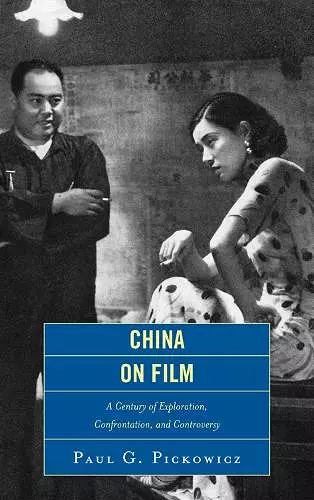China on Film
A Century of Exploration, Confrontation, and Controversy
Format:Paperback
Publisher:Rowman & Littlefield
Published:28th Feb '13
Currently unavailable, and unfortunately no date known when it will be back
This paperback is available in another edition too:
- Hardback£117.00(9781442211780)

Leading scholar Paul G. Pickowicz traces the dynamic history of Chinese filmmaking and discusses its course of development from the early days to the present. Moving decade by decade, he explores such key themes as the ever-shifting definitions of modern marriage in 1920s silent features, East-West cultural conflict in the movies of the 1930s, the strong appeal of the powerful melodramatic mode of the 1930s and 1940s, the polarizing political controversies surrounding Chinese filmmaking under the Japanese occupation of Shanghai in the 1940s, and the critical role of cinema during the bloody civil war of the late 1940s. Pickowicz then considers the challenging Mao years, including chapters on legendary screen personalities who tried but failed to adjust to the new socialist order in the 1950s, celebrities who made the sort of artistic and political accommodations that would keep them in the spotlight in the post-revolutionary era, and insider film professionals of the early 1960s who actively resisted the most extreme forms of Maoist cultural production. The book concludes with explorations of the highly cathartic films of the early post-Mao era, edgy postsocialist movies that appeared on the eve of the Tiananmen demonstrations of 1989, the relevance of the Eastern European “velvet prison” cultural production model, and the rise of underground and independent filmmaking beginning in the 1990s. Throughout its long history of film production, China has been embroiled in a seemingly unending series of wars, revolutions, and jarring social transformations. Despite daunting censorship obstacles, Chinese filmmakers have found ingenious ways of taking political stands and weighing in—for better or worse—on the most explosive social, cultural, and economic issues of the day. Exploring the often gut-wrenching controversies generated by their work, Pickowicz offers a unique and perceptive window on Chinese culture and society.
China on Film is a kaleidoscope of history, film, politics, and personalities that scans a tumultuous landscape across nearly a hundred years. The range is marvelous. We consider overarching questions, but they are always brought to life in charming, concrete detail. We meet some major figures in culture and politics but bohemians and underground loners, too. We get our feet in China’s earth but sense world currents as well. Our guide is a specialist insider, yet enough of an outsider that he can walk past taboos. As with any good kaleidoscope, this one sparkles at every turn. -- Perry Link, University of California, Riverside
This collection of essays by one of our preeminent scholars of Chinese film history has given us a panoramic study of different facets of Chinese filmmaking and filmmakers: from early films made in 1920s Shanghai through each of the subsequent decades all the way to the sociopolitical dynamics of today's underground filmmaking. Each of the twelve chapters takes on a specific issue or theme and relates it to the historical context in which it arose. Altogether they form a cohesive framework and argument in which the author's passionate commitment to Chinese cinema and Chinese culture is felt on every page. -- Leo Ou-fan Lee, The Chinese University of Hong Kong
This is the book on Chinese cinema that we have been waiting for. Few people have as deep and wide-ranging an understanding of Chinese film culture as Paul Pickowicz does. Admirably combining vigorous research and penetrating analysis, he provides us in this important book with an insightful, richly nuanced, and thought-provoking representation of the multivalent relations between popular cinema, social change, and political violence in China’s recent history. Creatively organized around influential filmmakers, controversial films, or historiographical themes, and written in an engaging style, this is a must-read for anyone interested in twentieth-century Chinese culture and society. -- Fu Poshek, University of Illinois at Urbana-Champaign
ISBN: 9781442211797
Dimensions: 228mm x 152mm x 21mm
Weight: 494g
376 pages